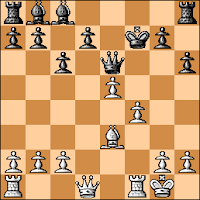1.e4 e5 2.Nf3 Nc6 3.Bc4 Bc5 4.Bxf7+ ...and related lines
(risky/nonrisky lines, tactics & psychology for fast, exciting play)
Wednesday, October 19, 2011
It seemed like a good idea at the time...
It stands to reason that in order for someone to lose to the Jerome Gambit (1.e4 e5 2.Nf3 Nc6 3.Bc4 Bc5 4.Bxf7+), that player must make at least one big mistake, or put together several small mistakes.
White can win any number of ways. He can pressure Black until he loses his cool and falters, or collapses due to over-confidence. He can set tricks and traps and wait for Black to fall into one. He can play steady chess and bide his time, knowing that Black's next error will come before his own. In blitz play, all of these strategies can suddenly bring about the win.
Often the second player runs afoul of a move (or plan) that "seemed like a good idea at the time."
Bill Wall notes of the following game "I didn't think I was going to survive this 5 minute game, but got lucky in a nice swindle. Frank Marshall would be proud."
Wall - Maas
blitz 5 0, Chess.com, 2011
notes by Bill [and Rick]
1.e4 e5 2.Nf3 Nc6 3.Bc4 Nf6
Waiting for a Jerome Gambit.
4.Nc3 h6
Not yet.
5.O-O Bc5
What do you think I am going to play?
6.Bxf7+
6...Kxf7 7.Nxe5+ Nxe5 8.d4 Bd6 9.dxe5 Bxe5 10.Nd5
[I have played 10.f4 a few times, but have seen 10.Nd5 played only one other time. It is probably the stronger move. - Rick]
10...c6 11.f4 Bb8 12.Nxf6 Qxf6 13.e5 Qe6 14.Be3
[Blood-thirsty players might try to counter Black's calm play with 14.f5!? - Rick]
14...d5 15.Qh5+ g6 16.Qh4 Bc7 17.Rae1 Bd8
[Black's Bishop glides to and fro, with hardly a care in the world. - Rick]
18.Qg3 Qg4
[After this "simple" attempt to exchange Queens and stem White's attacking efforts, the game is even; but Black does not settle for that. - Rick]
19.e6+ Bxe6 20.f5 Bxf5?? 21.Qxg4! and Black resigned
Labels:
Chess.com,
Jerome Gambit,
Maas,
Wall
Subscribe to:
Post Comments (Atom)






No comments:
Post a Comment